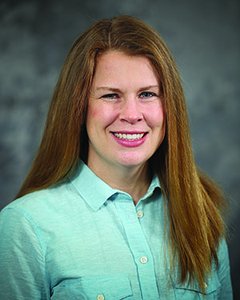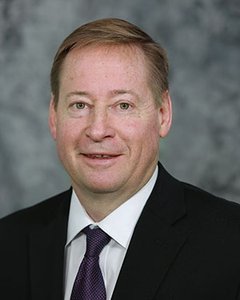The mission at Sarah Bush Lincoln is to provide exceptional care for all and create healthy communities. During the month of June, SBL recognizes Pride Month by focusing on inclusion and respect of employees and patients who are LGBTQ, while fostering an environment in which they feel comfortable seeking medical care.
SBL Child Psychiatrist Katie Hecksel, MD, who sees a large population of lesbian, gay, bisexual, transgender and queer or questioning (LGBTQ) youth and young adults in her clinic, and SBL Internist Jim Hildebrandt, DO, share their thoughts on the LGBTQ community.
Dr. Hecksel: According to the U.S. Centers for Disease Control and Prevention (CDC), LGBTQ youth are more likely to experience mental health struggles, substance use, food insecurity, homelessness, violence, bullying, abuse and neglect compared to non-LGBTQ youth. My job is to treat all patients with kindness and respect, to validate their feelings, to recognize their inherent worth as humans and help them get to a place where they can thrive from a mental health perspective.
Part of that respect and validation involves me calling patients by their preferred names. Transgender youth have very high rates of suicide and suicide attempts, in large part due to the bullying, hate and invalidation they experience in the world. Using a transgender patient’s preferred name is not any harder to me than calling another patient by a requested new nickname or using a new last name after they get adopted or married. In addition, it allows my transgender patients to feel seen, valued and respected.
There are many challenges that families may face when children come out as LGBTQ. Parents or caregivers may not know how to respond. They may worry about the safety of their LGBTQ children. They may struggle with beliefs that contradict their children’s experience. They may feel that their children’s sexual orientation or gender identity is “just a phase.” Children who come out to family members as LGBTQ also may be afraid of being rejected, shamed or hurt.
It is important to remember that everyone’s feelings—children’s and their family’s—are valid. It can take time to process the new information that is shared during the coming-out process. I recommend that parents try to remain calm and kind. Be curious and ask questions in a respectful manner. Remind your child that you love them. Seek your own support and learn how to best support your LGBTQ child.
In this community, we come from many different gender, ethnic, sexual orientation, socioeconomic and religious backgrounds. At the end of the day, it is far more important to help people feel that they matter and belong than to stigmatize and hurt them. You don’t need to fully understand people to be respectful and kind.
Dr. Hildebrandt: I am here to support my LGBTQ patients and their medical needs. Organizationally, the mission at SBL is to provide exceptional care to all, and that means everyone.
Providing medical care to the LGBTQ community in many ways overlaps with the medical care I provide all patients. In order to better understand and provide the best care possible, however, I researched healthcare issues that impact the LGBTQ population and the difficulties they may face. Some have been rejected by their families, fired by their employers, lack a support system, and struggle with anxiety and depression. They are at higher risk of dying by suicide.
My heart goes out to LGBTQ individuals who feel unsupported and struggle with mental health issues. Our job—our calling—is to provide quality care to everyone in need. I want everyone to feel comfortable receiving medical care at Sarah Bush Lincoln.




